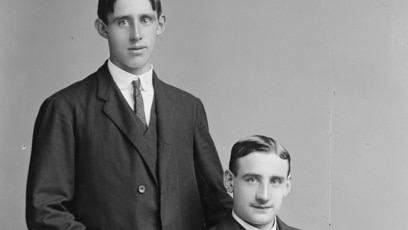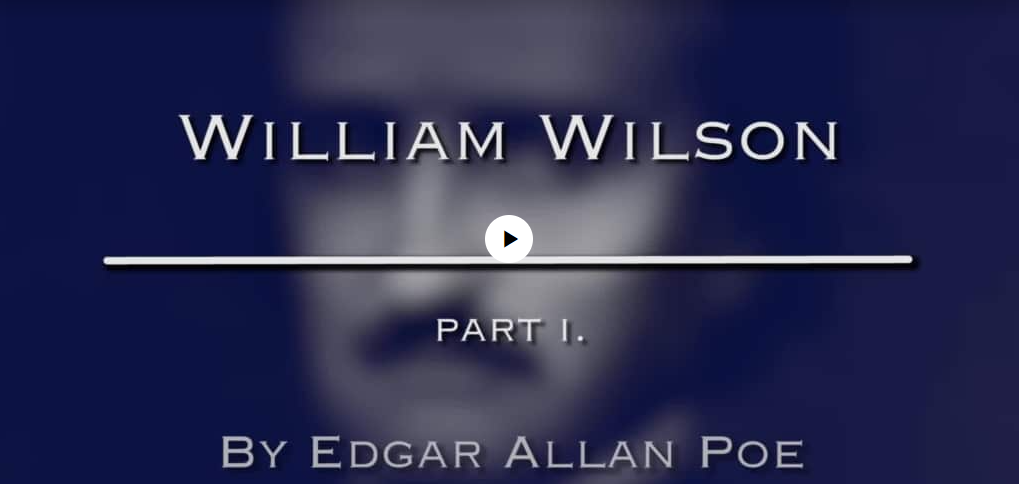We present the first of four parts of the short story “William Wilson,” by Edgar Allan Poe. The story was originally adapted and recorded by the U.S. Department of State.
Let me call myself, for the present, William Wilson. That is not my real name. That name has already been the cause of the horror – of the anger of my family. Have not the winds carried my name, with my loss of honor, to the ends of the earth? Am I not forever dead to the world? – to its honors, to its flowers, to its golden hopes? And a cloud, heavy and endless – does it not hang forever between my hopes and my heaven?
Men usually become bad by degrees. But I let all goodness fall from me in a single moment, as if I had dropped a coat. From small acts of darkness I passed, in one great step, into the blackest evil ever known. Listen while I tell you of the cause that made this happen. Death is near, and its coming has softened my spirit. I desire, in passing through this dark valley, the understanding of other men. I wish them to believe that I have been, in some ways, in the power of forces beyond human control. I wish them to find for me, in the story I am about to tell, some small fact that proves I could only have done what I did. I would have them agree that what happened to me never happened to other men. Is it not true that no one has ever suffered as I do? Have I not indeed been living in a dream? And am I not now dying from the horror and the unanswered question — the mystery of the wildest dream ever dreamed on earth?
I am one of a family well known for their busy minds. As a small child I showed clearly that I, too, had the family character. As I became older it grew more powerful in me. For many reasons it became a cause of talk among friends, and the hurt it did me was great. I wanted people always to do things my way; I acted like a fool; I let my desires control me.
My father and mother, weak in body and mind, could do little to hold me back. When their efforts failed, of course my will grew stronger. And from then on my voice in the house was law. At an age when few children are allowed to be free, I was left to be guided by my own desires. I became the master of my own actions.
I remember my first school. It was in a large house about three hundred years old, in a small town in England, among a great number of big trees. All of the houses there were very old. In truth, it was a dream-like and spirit-quieting place, that old town. At this moment I seem to feel the pleasant coolness under the shade of the trees, I remember the sweetness of the flowers, I hear again with delight I cannot explain the deep sound of the church bell each hour breaking the stillness of the day.
It gives me pleasure to think about this school — as much pleasure, perhaps, as I am now able to experience. Deep in suffering as I am — suffering only too real — perhaps no one will object if for a short time I forget my troubles and tell a little about this period. Moreover, the period and place are important. It was then and there that I first saw, hanging over me, the terrible promise of things to come. Ah, let me remember.
The house where we boys lived and went to school was, as I have said, old and wide. The grounds about it were large, and there was a high wall around the outside of the whole school. Beyond this wall we went three times in each week, on one day to take short walks in the neighboring fields, and two times on Sunday to go to church. This was the one church in the village, and the head-teacher of our school was also the head of the church. With a spirit of deep wonder and of doubt I used to watch him there! This man, with slow step and quiet, thoughtful face, in clothes so different and shining clean — could this be the same man who with a hard face and clothes far from clean stood ready to strike us if we did not follow the rules of the school? Oh, great and terrible question, beyond my small power to answer!
I well remember our playground, which was behind the house. There were no trees, and the ground was as hard as stone. In front of the house there was a small garden, but we stepped into this garden only at very special times, such as when we first arrived at school, or when we left it for the last time, or perhaps when father or mother or a friend came to take us away for a few days.
But the house! — what a delightful old building it was — to me truly a palace! There was really no end to it. I was not always able to say certainly which of its two floors I happened to be on. From each room to every other there were always three or four steps either up or down. Then the rooms branched into each other, and these branches were too many to count, and often turned and came back upon themselves! Our ideas about the whole great house were not very far different from the thoughts we had about time without end. During the five years I was there, I could never have told anyone how to find the little room where I and some eighteen or twenty other boys slept. The schoolroom was the largest room in the house — and I couldn’t help thinking it was the largest in the world. It was long and low, with pointed windows and heavy wood overhead. In a far corner was the office of our head-teacher, Mr. Bransby. This office had a thick door, and we would rather have died than open it when he was not there.
Inside the thick walls of this old school I passed my years from ten to fifteen. Yet I always found it interesting. A child’s mind does not need the outside world. In the quiet school I found more bright pleasure than I found later, as a young man, in riches, or, as an older man, in wrongdoing.
Yet I must have been different indeed from most boys. Few men remember much of their early life. My early days stand out as clear and plain as if they had been cut in gold. In truth the hotness of my character and my desire to lead and command soon separated me from the others. Slowly I gained control over all who were not greatly older than myself — over all except one. This exception was a boy who, though not of my family, had the same name as my own, William Wilson. This boy was the only one who ever dared to say he did not believe all I told him, and who would not follow my commands.
This troubled me greatly. I tried to make the others think that I didn’t care. The truth was that I felt afraid of him. I had to fight to appear equal with him, but he easily kept himself equal with me. Yet no one else felt, as I did, that this proved him the better of the two.
Indeed, no one else saw the battle going on between us. All his attempts to stop me in what I wanted to do were made when no one else could see or hear us. He did not desire, as I did, to lead the other boys. He seemed only to want to hold me back. Sometimes with wonder, and always without pleasure, I saw that his manner seemed to show a kind of love for me. I did not feel thankful for this; I thought it meant only that he thought himself to be very fine indeed, better than me. Perhaps it was this love he showed for me, added to the fact that we had the same name, and also that we had entered the school on the same day, which made people say that we were brothers. Wilson did not belong to my family, even very distantly. But if we had been brothers we would have been near to each other indeed, for I learned that we were both born on the nineteenth of January, eighteen hundred and nine. This seemed a strange and wonderful thing.
Now it’s your turn to use the words in this story. Have you ever had a friend who sometimes made you angry? How do you deal with that person? Let us know in the comments section.
QUIZ
Quiz – William Wilson, Part One

Start the Quiz to find out
_______________________________________________________________
Words in This Story
horror – n. a very strong feeling of fear, dread, and shock
degree(s) – n. an amount or level that can be measured or compared to another amount or level
suffer(ed) – v. to experience illness, or injury, or physical or emotional pain
church – n. a building that is used for Christian religious services
bell – n. a hollow usually cup-shaped metal object that makes a ringing sound when it is hit
perhaps – adv. possibly but not certainly
playground – n. an outdoor area where children can play
garden – n. an area of ground where plants, such as flowers or vegetables are grown
delightful – adj. very pleasant
branch(ed) – v. to divide into smaller parts
